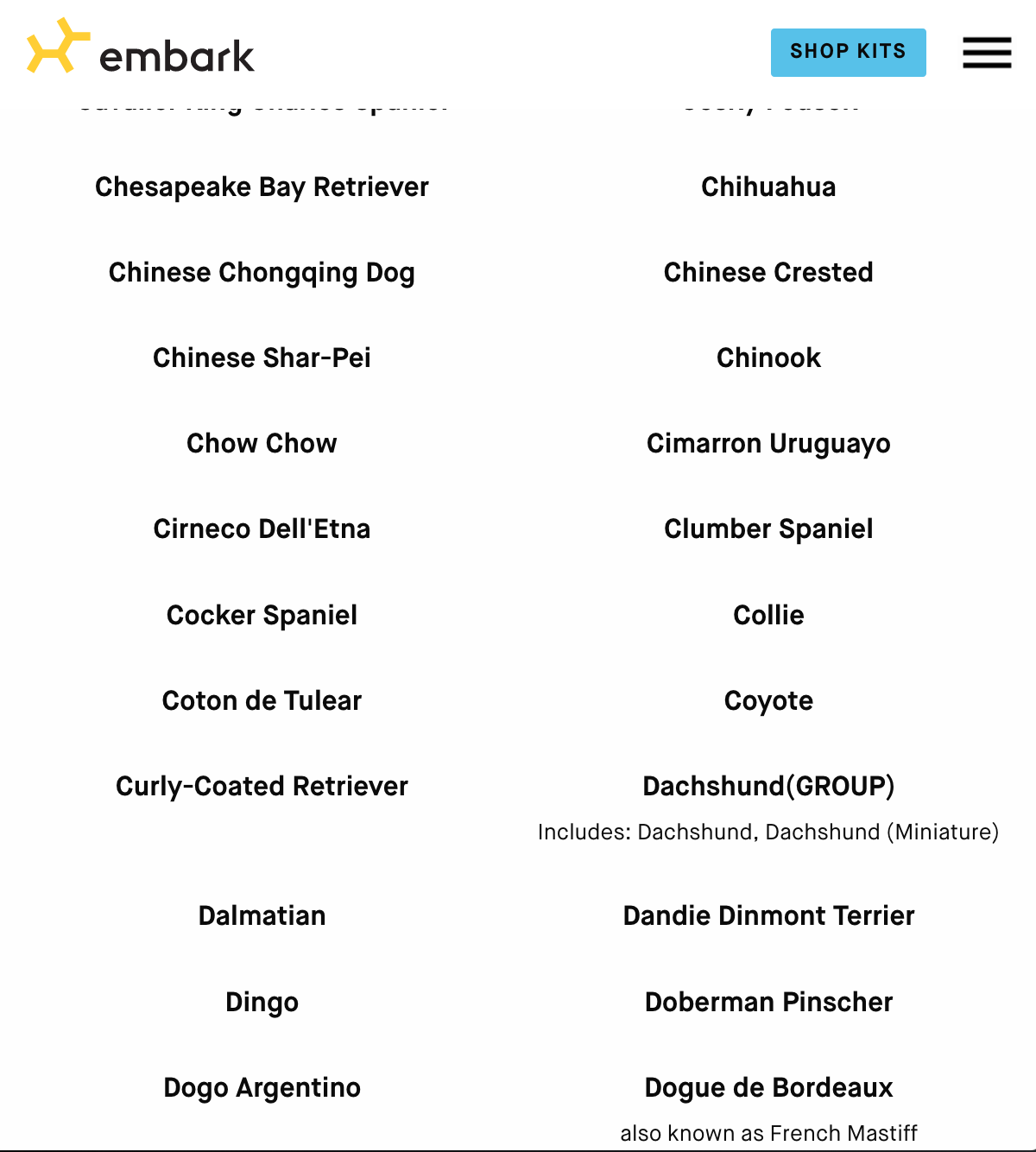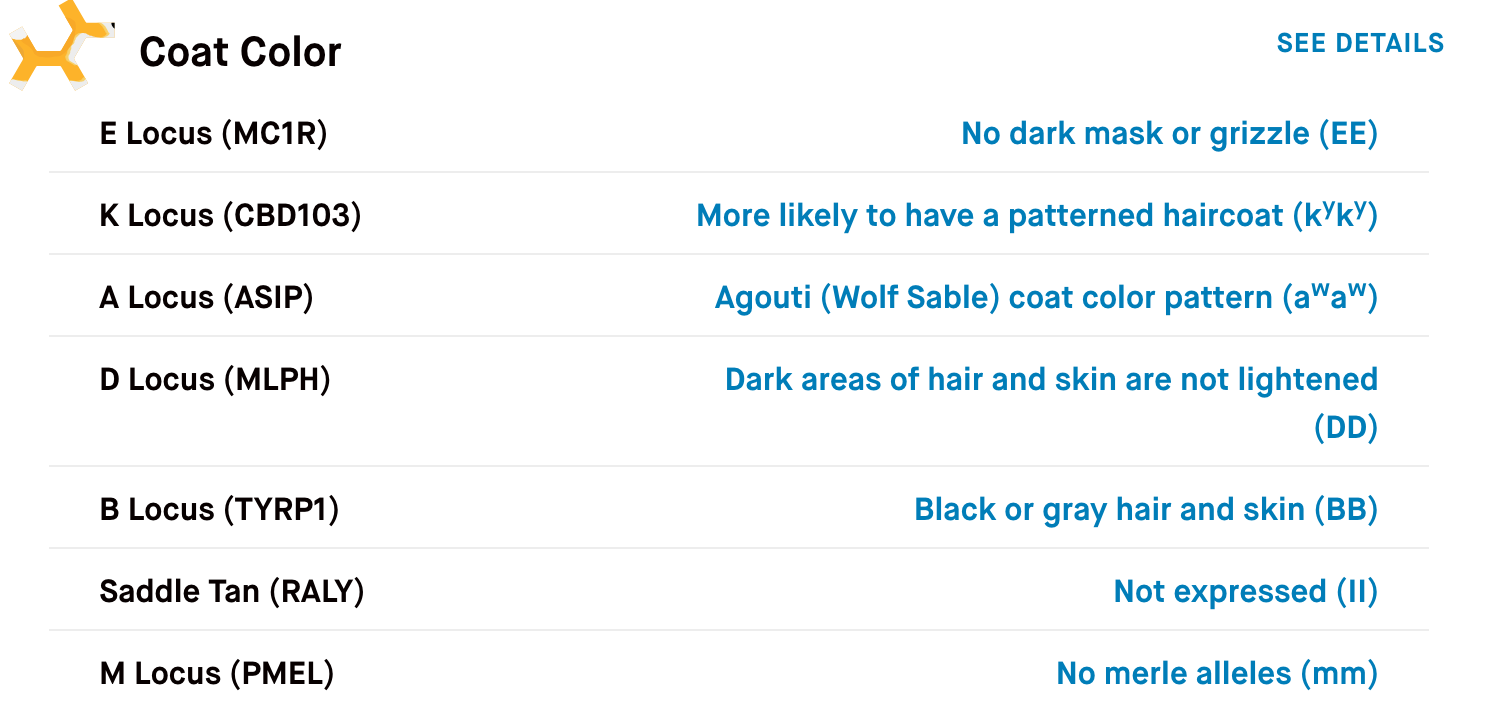Embark DNA Testing & Czechoslovakian Vlcak
Updates through September 2019
Since March of 2018 we have been working with Embark with cooperation from the Czechoslovakian Vlcak Club of America as well as many individual kennels and breeders from across Europe. Our goals are two-fold: one, to help establish a purebred baseline for the recognition of the breed under Embark's breed testing scheme, and two, to explore the current limitations in technology in the detection of unauthorized outcrosses. Embark is an American-based company which tests for breed, 170+ genetic health conditions, a slew of physical traits (like coat, size, etc), and genetic COI by one single buccal swab. You can read more about Embark here.
Around August of 2018, Czechoslovakian Vlcak became provisionally recognized by Embark. That is to say that the tests now return "Czechoslovakian Vlcak" as a breed, instead of the breakdown of the breed components into wolf and dog ratios. On telephone conferences with Embark's breeder relations teams, the verified & recognized breeds are listed under Embark's Breed List. Results of provisionally recognized breeds are still undergoing study and further refinement and are results are subject to future amendment.
In October 2018 along with our breed contacts around the world, we tested approximately fifty purebred Czechoslovakian Vlcak with cooperation from their owners under a research initiative. Owners participated with a range of dogs across Europe, encompassing a wide swath of the genetics existing within purebred Czechoslovakian Vlcak. From Spain to Slovakia, from Finland down to Greece, owners sent us pedigree information on their dogs and samples to Embark. Separately, we also set aside a number of flagged tests which we used to test CSV crosses including so-called mutara mixes and other obvious unauthorized mixes.
Because we respect the privacy of owners and the information regarding their dogs, at this time we cannot publicly post identifying information about individual dogs as we have not yet sought nor received releases. Many of the owners of the mixes have been exceedingly cooperative in trying to help resolve the issue of CSV mixes with fraudulent papers and we are thankful for their cooperation. Because of these efforts, valuable information has been gleaned and here we will share a small portion that we have analyzed and compiled with the help from, and through, Embark.

In the various genetic traits Embark tests for, all purebred CSV have the following physical traits:

Many of these traits were already known about the breed, including the fact that there are no dilution color genes within the purebred studbook. Of the fifty tested purebred CSV, the genetic wolf content generally correlates with the mathematically-calculated values based on their pedigree; that is to say, purebred CSV have historic content ranging within the 20s and mid-30s. Again, this is information that breed clubs had previously known and assumed based on calculations made on the pedigrees, and at this time Embark confirms the general range.
Coefficiency of Inbreeding (COI) is another very important piece of information that Embark provided for our project. Again, previous information on COI is based on calculations from pedigrees. CSV are not a landrace breed which may have dogs arising from other lines, and all lines and ancestors of CSV are recorded and known, down to which GSDs were utilized for the breed. Therefore, previously there was already some knowledge as to which lines and dogs would probably have the lowest COI within the breed. Embark also confirms this information with their genetic COI results; the lowest genetic COI so far tested is 26% belonging to a female from a line already assumed to be so. The breed genetic COI average is 33.5%.
We continue to add more dogs to the ongoing research with Embark, including recently submitting several samples from CSV affected by Pituitary Dwarfism. Currently, Embark is in the process of verifying their testing chip to accommodate this genetic test; if successful, it would provide the first state-side testing facility for the testing of Dwarfism. The timeline for inclusion of this test is still unknown. At this time, breed-relevant health/trait tests Embark offers includes Degenerative Myelopathy (DM), and FGF5 longhair mutation and hopefully soon also Dwarfism.
Now, what does the totality of this data mean? Well, for one it tells us what Czechoslovakian Vlcak are NOT - for example, they do not carry recessive b-locus (for dilute forest-brown coloration as in Saarloos or Siberian Husky). As mentioned above, we flagged and set aside a number of Embark tests and sampled CSV-mixes, some of which were back-crossed extensively. What we can say is that at the current time, Embark appears to have either technological limitations, or is in need of some parameter adjustments, when it comes to the reliability to detect CSV-mixes outside of 1-2 generations particularly when the animal has extensive backcrossing in their pedigree. On telephone conferences with Embark and also in written FAQS, Embark largely determines 'purity' based on how related the animal is to other animals of the same (assumed) breed tested: "An Embark test can be used to determine how similar or dissimilar your dog is genetically to other known purebreds of the same breed." Extensive backcrossing, of course, brings about high similarity.
At this time, Embark has returned a number of provisional "100% Czechoslovakian Vlcak" on animals we know not to be so, including italian Mutara. However, in a number of these results also exists information which is far more telling: for example, one of the mixes returned as being a CSV also carries for Black and Tan coloration (!!). Another result gave the dog's COI as an extremely low (and breed atypical) 14%. And yet another returned with 100% Czechoslovakian Vlcak, where the uncle (litter-mate to the mother)'s results returned as an American wolfdog mix with 50%+ content. We should also note that several of the mixes tested did actually return as mixes (and not as Czechoslovakian Vlcak) as well.
What this means for us is that the breed result being provisional should be heavily considered as being exactly that; it cannot be a reliable indicator of purebred CSV, or CSV-mixes at this time. Unfortunately for the breed, it also means that the old questions about certain lines cannot be definitively resolved with Embark at this time. We will continue to work with Embark, but understand that there may be simply technological limits which no company can address currently. Embark results are not a substitute for pedigree. However, we understand Embark to be useful in suspected cases of first-generation crosses, as well as randomly mixed dogs that may contain CSV.
We will continue with further refinement of the recognition of the breed within Embark's testing parameters and recommend the test as it gives a wide range of very useful information for breeders. Many thanks to all the owners, breeders, and breed clubs for your ongoing participation. None of this would be possible without your help.
